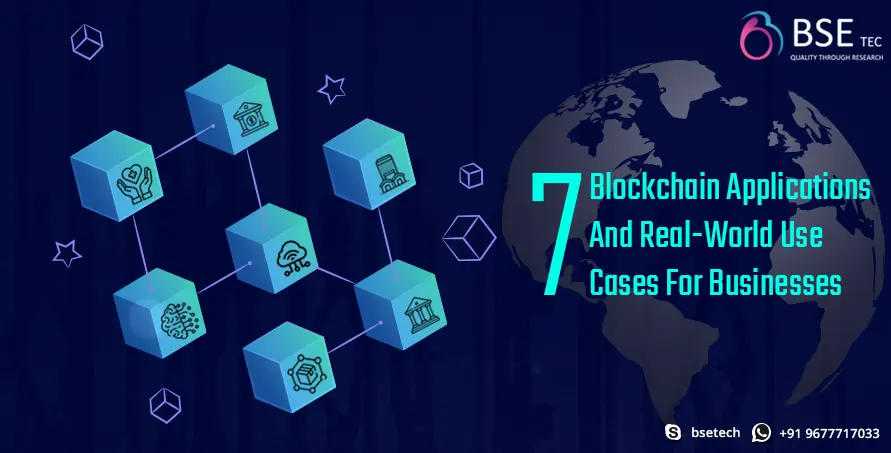7 Blockchain Applications And Real-World Use Cases For Business

Blockchain technology is the foundation of digital currencies like Bitcoin and Ethereum. The widespread use of blockchain technology and the goods and services it supports will significantly impact how businesses operate going forward. But blockchain technology is much more than just a way to send cryptocurrency safely across the internet. It can be applied outside of finance, including artist royalties, voting, welfare benefits, healthcare, insurance, and insurance.
Blockchain Applications And Real-World Use Cases For Business
- Healthcare
Blockchain for your medical and health information is a wise decision since, in an emergency, hospitals can easily refer to all of the records, past medical conditions, and drugs the patient has taken. Blockchain is an innovative new technology that allows people to transfer information instantly like medical records with each other without the need for a trusted intermediary, which helps in getting medical treatments sooner.
- Gaming Industry
The worldwide gaming market is anticipated to expand by $125.65 billion between 2020 and 2025, growing at a CAGR of 12.40%. Blockchain technology’s incorporation into blockchain-powered gaming apps is a key driver fueling the expansion of this business. Players can use NFTs and cryptocurrencies to buy in-game goods that can later be converted into real money. Also, rewarding players with crypto assets makes blockchain powered gaming more appealing.
- Cross-Border Payments
Blockchain is an innovative new technology that allows people to transfer money across the globe without the need for a trusted intermediary like forex. This means that transactions can occur almost instantly and with very low transaction costs, that too without intermediaries and additional service and transaction charges. All you have to pay is the gas fees involved for the transaction, which is much less than a traditional cross-border payment.
- Transportation & Logistics Apps:
Tracking a product’s journey from a factory to a warehouse to a retailer can be done using blockchain technology. Igor Barinov, the co-founder of Oracles Network, claims that using blockchain for supply chain management gives business owners greater visibility into their organization’s operations. If public networks are established, blockchain can boost transparency and align a business’ interests with those of the other members of its ecosystem, whether they be suppliers or clients. Additionally, transportation and logistics apps have a decentralized public ledger system that reduces clerical errors by recording all changes in real-time. Supply Chain Management Software segment revenue is predicted to show a CAGR of 6.53% between 2021–2025, resulting in a market volume of $22,082.52m by 2025.
Read How can blockchain be used in supply chain management?
- Copyright and Royalties
Making ensuring that artists are compensated for their work can be done by using blockchain technology to track music and movie files that are circulated online. Blockchain technology can be used to lessen piracy because it was developed to ensure that identical content doesn’t exist in more than one location. Furthermore, utilizing a smart contract to distribute royalties and a blockchain to track playbacks on streaming platforms can increase transparency and ensure that artists are paid what they are due.
- Smart Contracts
Smart contracts are computer programs that automatically execute when certain conditions are met. They’re similar to traditional contracts, except that they run on a distributed network rather than a centralized server. This means that smart contracts aren’t controlled by anyone. Instead, they operate autonomously based on the rules set out in the contract. In short, smart contracts are programmed codes that automatically execute if the conditions are met. Smart contracts give businesses a way to automatically manage lots of transactions without disclosing confidential or proprietary information, they can be used to interconnect services across several enterprises.
- Digital Identity-based Apps
A digital identity is a piece of data established on computer systems that identifies an external agent as being associated with an entity. Without having to present original certificates’ photocopies, the digital identity app allows consumers a more straightforward, faster, and more trustworthy way to prove their identity at various locations, including shops, websites, and pubs. In 2019, the global market for digital identification solutions generated $13.7 billion in sales. By 2024, it is predicted to reach $30.5 billion, growing at a compound yearly growth rate of 17.3%. (marketsandmarket.com).
If you are considering developing blockchain applications, I would advise you to seek professional assistance from a reputed Blockchain app development company as doing so will help you create a reliable and robust app. Contact BSEtec for more details.




